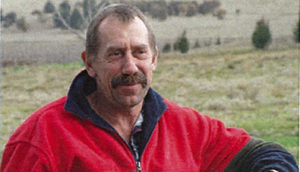Read the latest information on
Foot-and-mouth disease
 Lynn and Ian Rathjen, owners of ‘Whistling Eagle’ at Colbinabbin, run a successful vineyard with some cereal crops, pastures and stud Border Leicester flock. They make red and white wines on site from the 30 hectare vineyard but also sell fruit to others.
Lynn and Ian Rathjen, owners of ‘Whistling Eagle’ at Colbinabbin, run a successful vineyard with some cereal crops, pastures and stud Border Leicester flock. They make red and white wines on site from the 30 hectare vineyard but also sell fruit to others.
“We implemented strict biosecurity practices because there was an immediate threat to our income and way of life.”
The Rathjens sell rams and use 60 hectares of cereals and pastures for mulch, hay and supplementary stock feed. They also manage a 20 hectare native tree plantation which adds aesthetic value to the property, improves biodiversity by providing habitat to many species of birds and provides future income options when the stand matures.
Judges for the award were impressed with the integration of biosecurity across a highly mixed enterprise and their commitment to pursuing recommended biosecurity practices in each area of farming activity.
For the Rathjens, biosecurity largely means preventing the entry of pests and diseases through good hygiene practices. They recognised the threat presented by both plant pests (grapevine phylloxera) and animal diseases (ovine Johne’s) in their district and implemented measures that would help ensure the long-term freedom from both of these threats.
Mr Ian Rathjen said: “We implemented strict biosecurity practices because there was an immediate threat to our income and way of life. It also made sense to ensure we did everything we could as ‘good citizens’ to not contribute to the spread of pests and diseases. We are very aware of our obligations and responsibilities to our industry and the district.
“Grape phylloxera is the biggest threat to our livelihood. Currently we are zoned in a Phylloxera Exclusion Zone (PEZ). This PEZ status is worth protecting at all costs – our livelihood depends on it.”
The threat of ovine Johne’s disease (OJD) has also driven our biosecurity practices. Most procedures to protect our small flock from OJD are in parallel with those keeping out grapevine Phylloxera. We currently have a flock declared free from OJD and get audited every year by veterinarians. Every effort must be made to ensure the integrity of our flock and restrict the spread of this devastating disease.”
The success of this enterprise relies on everybody sticking to the hygiene rules.
“We are all affected in that it does take a little extra time out of the day to ensure we stick to our hygiene rules, but we can’t afford not to,” Mr Rathjen said.